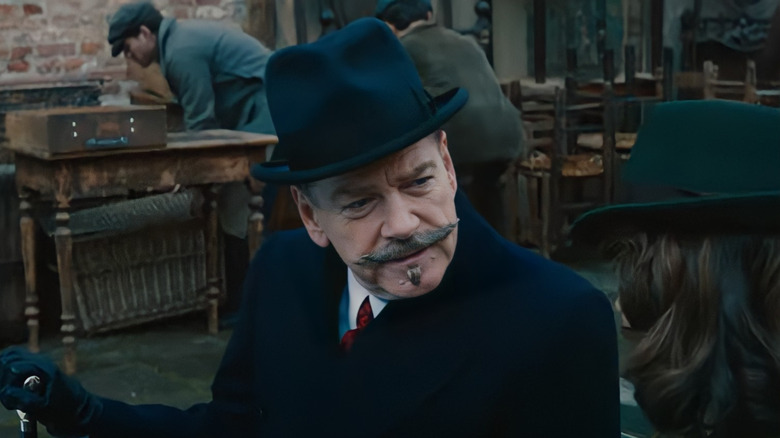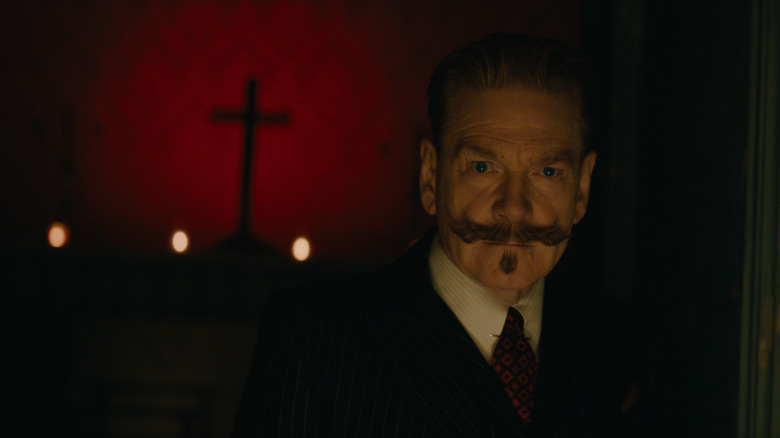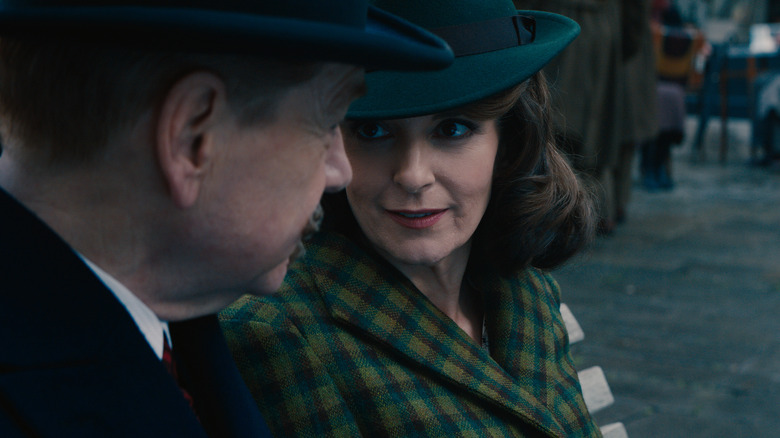Why A Haunting In Venice Decided To Move Agatha Christie's Story To Italy
Kenneth Branagh has directed and starred in three movies so far based on Agatha Christie's murder mystery novels, but none of them have taken place primarily in England, the country where Christie lived and where she based so many of her stories. For the first two movies, this wasn't particularly unusual. The source material for "Murder on the Orient Express" also had Poirot spend the book on a train ride from Istanbul, just as "Death on the Nile" was always a vacation mystery in Egypt. It's only with this third film, "A Haunting in Venice," that we're starting to wonder if Branagh has some vendetta against England.
The book this new movie is based on is "The Hallowe'en Party," one in which a teenage girl is unexpectedly murdered in Woodleigh Common, a small English village. The book was written in 1969 and although it's somewhat vague about the timeline, it seems like the story takes place in 1969 as well. Meanwhile, "A Haunting in Venice" is set in Venice, Italy in the years immediately following World War II. It's easy to understand the time shift — it's a lot harder to brush past Poirot's lack of aging in a film format — but why abandon the English setting?
"Probably one of the things was visual," explained the film's executive producer, James Pritchard to Screen Rant. "Venice just has an extraordinary aspect that adds something to the film, but also there is an element of Venice, which plays into the tone [...] Those canals wending their way through narrow passages has an era of mystery, of thriller ... if you're going to make a horror film, you want something that has a little bit of atmosphere. Venice has an extraordinary atmosphere and sense of mystery," he said.
Throwing in some otherworldly vibes
"It's exotic and it's gothic, it's mysterious," Branagh himself said of the setting earlier this year to Empire. Most of the film is set inside a palazzo, a type of large, imposing building that Venice in particular is known for. It's the perfect setting for a haunted house story, which is exactly what "A Haunting in Venice" seems interested in being. Branagh sees Poirot as a supernatural skeptic, and everything about this movie feels designed to convert him into a believer. "When you are isolated, perhaps in a haunted palazzo, it can suddenly be very much more," Branagh explained. "Across that long, dark night of the soul, the action taking place across a single murder-filled evening, it can challenge your previously firmly-held convictions that there's nothing out there."
It's a surprising approach, especially considering that there weren't any supernatural vibes in the source material at all. "The Hallowe'en Party" was a typical whodunnit novel, one that wasn't interested in challenging Poirot's worldview about anything, let alone the supernatural. Branagh's desire to force his version of Poirot to question his preconceived notions of the world isn't anything out of left field. However, he's always been trying to complicate the character, making him feel more like a real person than just a stock detective archetype. Branagh's decision to add elements to Poirot's backstory that were never there in the books is sometimes a mistake, like in the last movie where he decided to give us a long, melodramatic, unnecessary flashback sequence showing us how Branagh got his famous mustache. But perhaps with this new film, fleshing out Poirot can turn out for the best.
Switching up the themes
The other big shift this move to Italy promises is an abandonment of the source material's social commentary. "The Hallowe'en Party" spent a lot of its word count dealing with the changing social norms in England at the time, with the older characters constantly remarking (accurately or otherwise) about the country's rising crime and how much more dangerous the world had become for young women. The adult characters would constantly vent about the lack of proper guidance this new generation of British kids had, and that's why these kids are apparently so much ruder, sillier, and more likely to be murdered than the kids of previous generations.
It's a questionable running theme throughout the book, and the downbeat tone was part of what led to it receiving a mixed reception from literary critics at the time. But this thematic throughline of the decay of England's societal norms is another thing that appears to be completely absent from the movie, at least if the trailer is any indication. It's an omission that makes the choice to move the story to Venice seem even more reasonable. If you're already removing the book's central critique of a changing British society, then there's no longer any big reason to stay in the country.
Will this movie's many adaptive flairs work out well this time? With "A Haunting in Venice" airing in theaters now as of September 15, 2023, there's only one way to find out.


